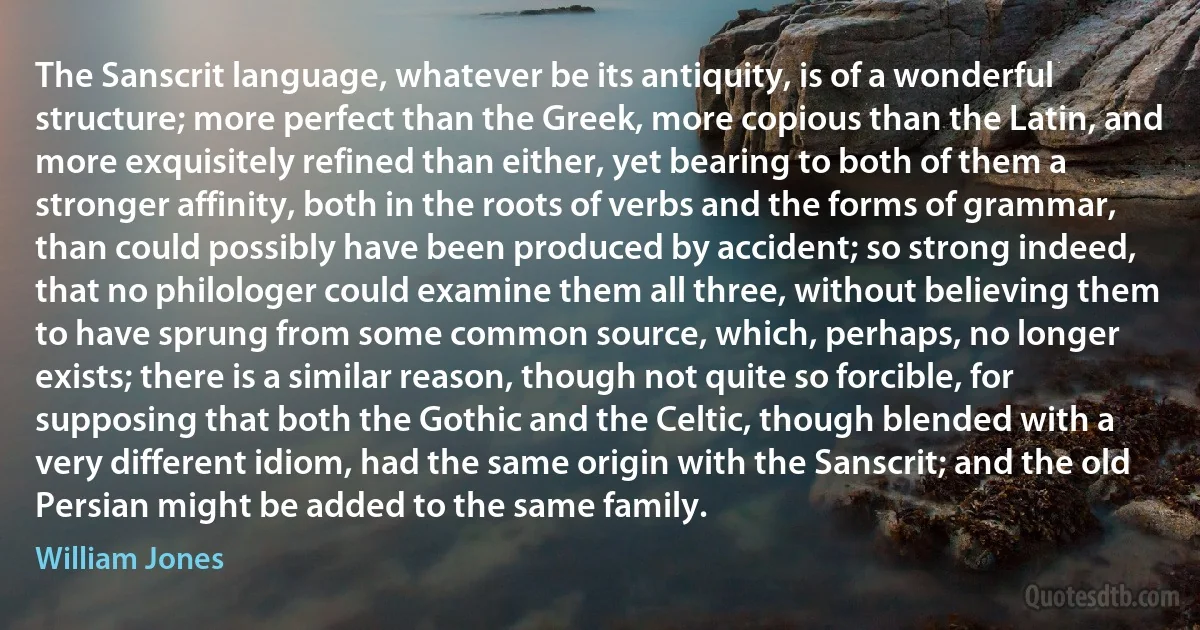
The Sanscrit language, whatever be its antiquity, is of a wonderful structure; more perfect than the Greek, more copious than the Latin, and more exquisitely refined than either, yet bearing to both of them a stronger affinity, both in the roots of verbs and the forms of grammar, than could possibly have been produced by accident; so strong indeed, that no philologer could examine them all three, without believing them to have sprung from some common source, which, perhaps, no longer exists; there is a similar reason, though not quite so forcible, for supposing that both the Gothic and the Celtic, though blended with a very different idiom, had the same origin with the Sanscrit; and the old Persian might be added to the same family.
William JonesRelated topics
accident bearing celtic common different family gothic grammar idiom language latin longer might perfect perhaps quite reason source spring three whatever yet rootsRelated quotes
A common monetary standard will be established, with the consent of the various governments, by which industrial transactions will be greatly facilitated. Three spheres made respectively of gold, silver, and platinum, and each weighing fifty grammes, would differ sufficiently in value for the purpose. The sphere should have a small flattened base, and on the great circle parallel to it the Positivist motto would be inscribed. At the pole would be the image of the immortal Charlemagne, the founder of the Western Republic, and round the image his name would be engraved, in its Latin form, Carolus; that name, respected as it is by all nations of Europe alike, would be the common appellation of the universal monetary standard.

Auguste Comte
Many similarities of basic design among animal phyla, once so confidently attributed to convergence, and viewed as testimony to the power of natural selection to craft exquisite adaptation, demand the opposite interpretation that Mayr labeled as inconceivable: the similar features are homologies, or products of the same genes, inherited from a common ancestor and never altered enough by subsequent evolution to erase their comparable structure and function. The similarities record the constraining power of conserved history, not the architectural skills of natural selection independently pursuing an optimal design in separate lineages. Vertebrates are, in a certain sense, true brothers (or homologs) - not mere analogs - of worms and insects.

Stephen Jay Gould
Now when naturalists observe a close agreement in numerous small details of habits, tastes and dispositions between two or more domestic races, or between nearly-allied natural forms, they use this fact as an argument that all are descended from a common progenitor who was thus endowed; and consequently that all should be classed under the same species. The same argument may be applied with much force to the races of man.
As it is improbable that the numerous and unimportant points of resemblance between the several races of man in bodily structure and mental faculties (I do not here refer to similar customs) should all have been independently acquired, they must have been inherited from progenitors who were thus characterised.

Charles Darwin
On examination, I have found [Hinduism] to be the most tolerant of all religions known to me. Its freedom from dogma makes a forcible appeal to me in as much as it gives the votary the largest scope for self-expression. Not being an exclusive religion, it enables the followers of the faith not merely to respect all the other religions, but it also enables them to admire and assimilate whatever may be good in the other faiths. Non-violence is common to all religions, but it has found the highest expression and application in Hinduism. (I do not regard Jainism or Buddhism as separate from Hinduism.) Hinduism believes in the oneness not of merely all human life but in the oneness of all that lives.

Mahatma Gandhi
One outcome of the Norman Conquest was the making of the English language. ...the speech of Alfred and Bede, was exiled from hall and bower, from court and cloister, and was despised as a peasant's jargon... It ceased almost, though not quite, to be a written language. ... Now when a language is seldom written and is not an object of interest to scholars, it quickly adapts itself in the mouths of plain people to the needs and uses of life. ...it can be altered much more easily when there are no grammarians to protest. During the three centuries when our native language was a peasant's dialect, it lost its clumsy inflexions and elaborate genders, and acquired the grace, suppleness, and adaptability which are among its chief merits.

G. M. Trevelyan
